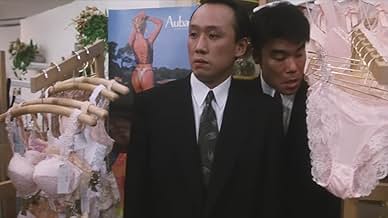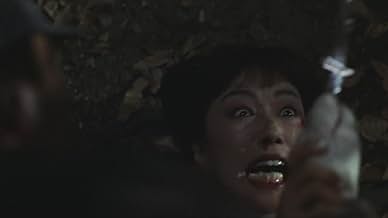A vain actress who witnessed a serious crime is guarded by 2 cops as she goes about her daily affairs.A vain actress who witnessed a serious crime is guarded by 2 cops as she goes about her daily affairs.A vain actress who witnessed a serious crime is guarded by 2 cops as she goes about her daily affairs.
- Awards
- 6 wins & 2 nominations
Photos
- Director
- Writer
- All cast & crew
- Production, box office & more at IMDbPro
Storyline
Did you know
- TriviaWhile methods used by the cult to harrass the public may seem extreme and the police are portrayed as bumbling and inadequate, Juzo Itami himself was treated with extreme measures by a mafia organizations which directly resulted in his death.
- GoofsIn the theatre when Biwako (as Cleopatra) falls to the floor, she drops the rubber snake. The camera immediately cuts to a closer shot and the snake is gone.
- ConnectionsReferences The Soft Skin (1964)
Featured review
Marutai is a slang used by the Japanese police indicating either a criminal or a witness that needs constant surveillance or protection. It's obviously related to Marusa of Marusa no Onnna which was also a movie made by Jyuzo Itami.
One day in the dark, actress Biwako (Nobuko Miyamoto) witnesses a murder. She becomes an unwitting witness of the crime and police asks her to be the lead witness in the trial. The gangs who sent the assassin sends their lawyer Nihonmatsu (Toru Emori) to bribe Biwako so she wouldn't take the stand. Biwako refuses, and the gangs are now out to kill Biwako before the trial.
The movie is comedic and serious at the same time like all other Itami's movies. Biwako gets into lot of trouble just because she was at the wrong place at the wrong time. Her life is threatened, but she has two police officers who are willing to stake their own lives to protect her. It's a story of extraordinary things happening to the life of an ordinary person, but it might have more of Itami's personal message than his other movies, as explained below.
This was the last movie made by director Jyuzo Itami. His death is rumored to be a foul play by the gangs because Itami continued to shed lights into the inner workings of the Japanese underworld (as in his Minbo no Onna, and this movie). Making people's death seem like suicide is the favorite tactics employed by Japanese gangs, and it's reported that Itami had no reason to commit suicide by people who were close to him. Itami was attacked and stabbed by yakuza few years before this movie was made, so it's no news that he was under their radar. Itami might have been feeling the pressure which might have influenced him to make this movie. This movie might have been the last straw that tipped the scale. In any case, his loss to Asian cinema was great as he was one of the directors who continued to produce quality movies throughout the years.
Itami's widow Nobuko Miyamoto who is also the star of this movie created a museum in his name recently. We will miss Itami's humor and insight, as we will probably never see the likes of him again.
One day in the dark, actress Biwako (Nobuko Miyamoto) witnesses a murder. She becomes an unwitting witness of the crime and police asks her to be the lead witness in the trial. The gangs who sent the assassin sends their lawyer Nihonmatsu (Toru Emori) to bribe Biwako so she wouldn't take the stand. Biwako refuses, and the gangs are now out to kill Biwako before the trial.
The movie is comedic and serious at the same time like all other Itami's movies. Biwako gets into lot of trouble just because she was at the wrong place at the wrong time. Her life is threatened, but she has two police officers who are willing to stake their own lives to protect her. It's a story of extraordinary things happening to the life of an ordinary person, but it might have more of Itami's personal message than his other movies, as explained below.
This was the last movie made by director Jyuzo Itami. His death is rumored to be a foul play by the gangs because Itami continued to shed lights into the inner workings of the Japanese underworld (as in his Minbo no Onna, and this movie). Making people's death seem like suicide is the favorite tactics employed by Japanese gangs, and it's reported that Itami had no reason to commit suicide by people who were close to him. Itami was attacked and stabbed by yakuza few years before this movie was made, so it's no news that he was under their radar. Itami might have been feeling the pressure which might have influenced him to make this movie. This movie might have been the last straw that tipped the scale. In any case, his loss to Asian cinema was great as he was one of the directors who continued to produce quality movies throughout the years.
Itami's widow Nobuko Miyamoto who is also the star of this movie created a museum in his name recently. We will miss Itami's humor and insight, as we will probably never see the likes of him again.
Details
Contribute to this page
Suggest an edit or add missing content

Top Gap
By what name was Woman in Witness Protection (1997) officially released in Canada in English?
Answer



















